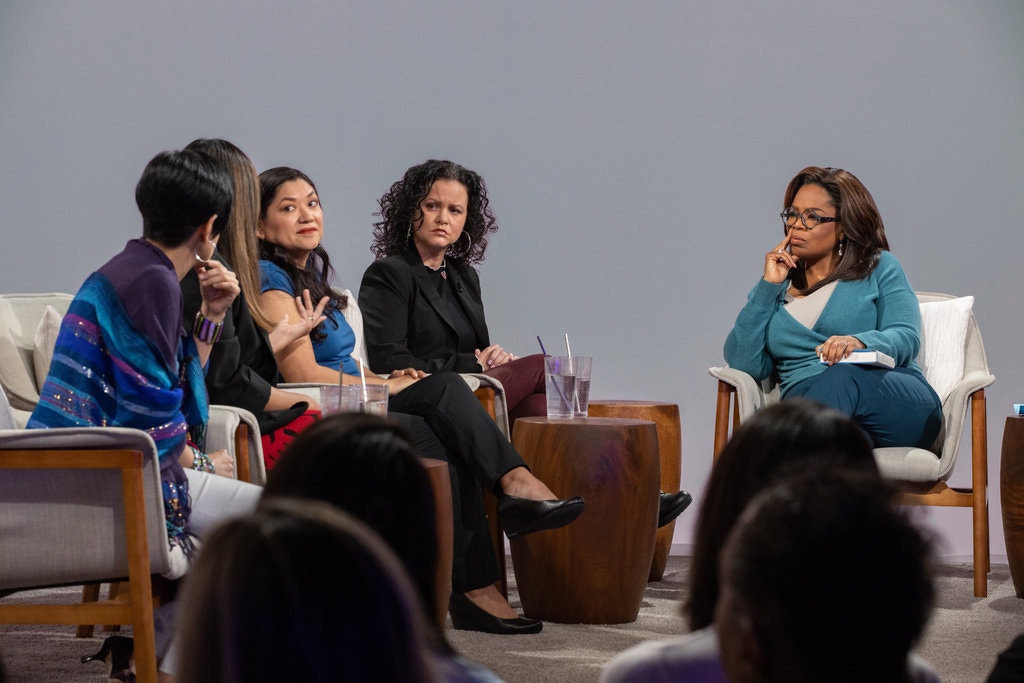When Oprah Winfrey revealed Jeanine Cummins’s American Dirt—an ill-received novel about a Mexican mother and her son’s journey across the border—would be part of Oprah’s Book Club she announced her selection as a one that could open people’s eyes to the humanitarian crisis at the border.
“Like so many of us, I’ve read newspaper articles and watched television news stories and seen movies about the plight of families looking for a better life,” Oprah explained. “But this story changed the way I see what it means to be a migrant in a whole new way.”
Though earnest and well-intentioned, her pick caused immediate controversy. Watching the two-part episode of Oprah’s Book Club focused on American Dirt is to see both the eye-opening conversations the talk show host hoped to have as well as the more uncomfortable ones she couldn’t well ignore.
When Oprah introduced Cummins to her live audience in Tucson, AZ, she obliquely recapped the heated debate the novel (and her pick) had inspired.
“I fundamentally believe in the rights of anyone to use their imagination and their skills to tell stories,” she told her audience. That intro set the tone for her interview with Cummins and the roundtable discussion she then hosted with authors Reyna Grande, Julissa Arce and Esther Cepeda—all of whom had written pieces critical of American Dirt. It was a defensive posture which pit any critique of Cummins’s novel as a call for censorship.
For anyone who’s closely followed the dustup over this novel, that framing can’t help but feel insufficient. But, the question of whether Cummins—who had described herself as White in print before, now openly talks about her Puerto Rican grandmother and has been candid about how little she knew about Mexico before working on the novel—should have written a story about a mother and child on the run from a cartel boss has been central to how American Dirt was received. Much to Oprah’s credit, she delves into these questions head on, even getting Cummins to revisit the line in her author’s note that surely made this debate feel even more urgent.
In the book, Cummins notes that she wishes “someone slightly browner” would have written it. Visibly uncomfortable and clearly weighing her every word, the author is as candid as her talking points allow. (Indeed, for anyone who listened to the Latino USA episode on this same controversy, many of her answers will sound eerily familiar.)
While the claims of appropriation and exploitation have followed the book around since its publication, its seven figure book deal has spurred even more outrage about a publishing industry’s continued disregard for Latinx authors and their stories. Here’s where Oprah’s roundtable with Grande, Arce and Cepeda—as well as interactions with Cummins’s editor and publisher at Macmillan—were promising if frustrating.
Hearing Grande talk about how publishers make immigrant writers feel ashamed of their stories, Arce share how she’s constantly asked to make her immigrant story more palatable to white audiences and witnessing Cepeda call out Oprah for not choosing more Latinx writers for her Book Club is arguably what makes this special worth watching.
It’s a testament to these three Latina writers that they constantly steered the conversation away from Cummins and lent a voice to grievances Latinx writers have long felt about gatekeepers in the industry.
“I am guilty of not looking for Latinx writers,” Oprah told Cepeda. “I will tell you I’m guilty of that because I haven’t looked for any particular race for any book. I just look for the book that I particularly like or somebody recommends to me.”
Much like the rest of the episode or any response given by Macmillan, it was an apology that didn’t acknowledge or concretely offer any correctives to the systemic issues that American Dirt had helped crystallize. Instead, this was all a conversation starter. A chance to continue a dialogue. An opportunity to hear from all sides. And yes, that means we even get to hear many an audience member praising the book for doing precisely what Oprah and Cummins had hoped, saying it had moved them and opened their eyes to the plight of its characters.
Therein lies the reason why the two-part episode is frustrating to watch: it repeatedly re-centers the conversation in ways that demand readers and viewers be thankful for the controversy altogether. Shouldn’t we be thankful we live in a world where American Dirt can so move readers to understand the border crisis? Shouldn’t we be thankful that Macmillan’s tone-deaf marketing gave way to a probing conversation about #DignidadLiteraria? Shouldn’t we be thankful that Oprah’s pick gave way to such heated and necessary discussions?
Such manipulative persuasion makes for enjoyable if enraging TV, worthwhile because of the necessary way in which three Latinas made sure to use their seat at the table to advocate for a world where they wouldn’t just be grateful for the invitation.
Oprah’s Book Club is now streaming on Apple TV+







